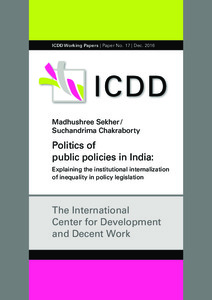| dc.date.accessioned | 2023-05-12T12:29:08Z | |
| dc.date.available | 2023-05-12T12:29:08Z | |
| dc.date.issued | 2016 | |
| dc.identifier | doi:10.19211/KUP9783737602495 | |
| dc.identifier.isbn | 978-3-7376-0249-5 (e-book) | |
| dc.identifier.uri | urn:nbn:de:0002-402498 | |
| dc.identifier.uri | http://hdl.handle.net/123456789/14702 | |
| dc.language.iso | eng | eng |
| dc.publisher | kassel university press | |
| dc.rights | Urheberrechtlich geschützt | |
| dc.rights.uri | https://rightsstatements.org/page/InC/1.0/ | |
| dc.subject.ddc | 320 | |
| dc.title | Politics of public policies in India | eng |
| dc.type | Working paper | |
| dcterms.abstract | The focus on poverty and inequality in development discourse has generally been an acknowledgement of the gaps between the poor and the affluent. This is seen as an economic condition linked to livelihoods and employment deprivation, or a condition rooted in the broader socio-cultural moorings of the society creating entitlement and capability deprivations. However, the issue here is how inequality concerns impact and are reflected in public policies. What are the drivers that determine the interests and structural coalitions that shape government welfare agendas, and in turn public policies on inequality? The processes shaping the conceptualization of inequality concerns within the policy framework have not been adequately comprehended in the development discourse. This involves a focus on policies that address the need for human capital development (e.g. social sector policies like health, education, and employment and livelihoods). However, it also requires a focus on institutions and processes that can impact the ability of people to influence public policies affecting them directly and their ability to build and protect their assets, and to gain access to public and private resources and services. Policy legislation is, in other words, also a product of different interests represented in the policy domain and the structural coalitions through which interests become represented, such as political parties and civil society groups, and how this determines the politics of state action, particularly in federal-parliamentary systems like India. In the process of governance, this creates an institutional landscape of competing pressures that forms the core politics of public policy formulation and public service provision. This paper discusses the institutional internalization of the politics in public policy legislation in India to address inequality. Constituting a major characteristic of the ‘patronage democracy’ witnessed in the country, public policy legislation reflects the politically construed institutional internalization of concerns. The policies not only reflect equality concerns, but also involve a comprehension of equality within the framework of citizen demands for development and inclusion, and the political rationalization of what can secure electorate support. | eng |
| dcterms.accessRights | open access | |
| dcterms.creator | Sekher, Madhushree | |
| dcterms.creator | Chakraborty, Suchandrima | |
| dcterms.extent | 38 Seiten | |
| dc.contributor.corporatename | Kassel, Universität Kassel, International Center for Development and Decent Work (ICDD) | |
| dc.publisher.place | Kassel | |
| dc.relation.isbn | 978-3-7376-0248-8 (print) | |
| dc.subject.swd | Indien | ger |
| dc.subject.swd | Politische Entscheidung | ger |
| dc.subject.swd | Soziale Ungleichheit | ger |
| dc.subject.swd | Institutionenökonomie | ger |
| dc.subject.swd | Armut | ger |
| dc.subject.swd | Bekämpfung | ger |
| dc.subject.swd | Nepotismus | ger |
| dc.title.subtitle | Explaining the institutional internalization of inequality in policy legislation | eng |
| dc.type.version | publishedVersion | |
| dcterms.source.series | ICDD Working Papers | |
| dcterms.source.volume | No. 17 | |
| kup.iskup | true | |
| kup.series | ICDD Working Papers | |
| kup.subject | Wirtschaftswissenschaft | |
| kup.typ | Monographie | |
| kup.institution | FB 05 / Gesellschaftswissenschaften | |
| ubks.nodoigen | true | |
| kup.binding | Softcover | |
| kup.size | DIN A4 | |


